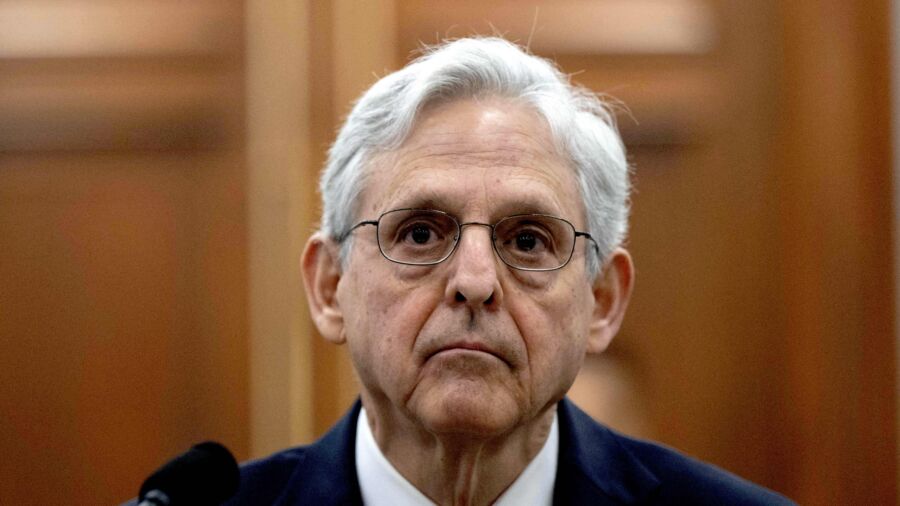Attorney General Merrick Garland has declined a lawmaker’s call for the Department of Justice (DOJ) to investigate alleged violations of the right to a speedy trial for defendants facing charges for their actions at the U.S. Capitol on Jan. 6, 2021.
Rep. Andrew Clyde (R-Ga.) asked Garland about the 6th Amendment trial rights of various Jan. 6 defendants during a House Appropriations subcommittee hearing on Wednesday. During the hearing, Clyde noted he had toured the DC Department of Corrections last week and met with several defendants still in pretrial detainment over the charges they face due to their actions on Jan. 6, 2021.
During his questioning of Garland, Clyde noted that the Speedy Trial Act of 1974 codifies the timelines surrounding the portion of the 6th Amendment that describes a person’s right to a speedy and public trial by an impartial jury. Clyde noted that the 1974 law states a trial “must commence within 70 days from the date the information or indictment was filed, or from the date the defendant appears before an officer of the court in which the charge is pending, whichever is later.”
Clyde then noted he had met with some Jan. 6 defendants and asked Garland, “Is it correct that since their arrests, some of these individuals have been waiting approximately two years for their trial.”
“Look, I don’t know the specifics of individual cases,” Garland replied.
Garland then noted exceptions to the speedy trial timeframe can include motions by the defendants and their counsel to delay for more time to review discovery evidence, of which Garland said there “was an enormous amount” in certain Jan. 6 cases. Clyde then asked Garland to determine which defendants had met the speedy trial timeline exceptions.
“I would like you to look into that because, to me, I don’t think waiting two years for your trial complies with the 6th Amendment of the Constitution,” Clyde said.
“This is an argument to be made before the judge,” Garland replied. “The judge has the authority to dismiss a case for a violation of the Speedy Trial Act.”
“You’re absolutely correct; a judge does have that authority,” Cylde responded. “You know, like you said in your opening statement, you work to uphold the civil rights of all Americans. I think in this case, their civil rights are being violated, and I would appreciate you looking into that.”
Garland did not respond before Clyde moved on to another line of questioning.
NTD News contacted the DOJ for further clarification on whether it will investigate alleged violations of the defendants’ speedy trial provisions. The department did not respond before this article was published.
Feds Admit Speedy Trial Act Violation
Last year, federal prosecutors did admit to unintentionally delaying a trial for Jan. 6 defendant Lucas Denney beyond the limits of the Speedy Trial Act. Denney was arrested on Dec. 13, 2021. The government finally secured an indictment against him on March 7, 2022—two days after his defense lawyers formally petitioned for his release and dismissal of the charges.
The government argued that it had not acted in bad faith and that the delays were not so egregious as to warrant dismissing the case “with prejudice,” meaning prosecutors could not recharge Denney.
Denney sought to plead guilty during his arraignment to a single-charge indictment for assaulting an officer with a dangerous weapon. Denney’s attorney William Shipley hoped the guilty plea would preclude the government from bringing a revised indictment with additional charges.
The judge in Denney’s case accepted his plea deal and sentenced him in September to 52 months in prison, three years of supervised release, and restitution to be determined later by the Court.
Other Allege Pre-Trial Rights Violations
Jan. 6 defendants have claimed they’ve experienced abuses while held in jail cells awaiting trial.
Some say they were subjected to long stretches in solitary confinement and beatings by prison guards. A January 2022 inspection of the DC jail facilities holding Jan. 6 defendants by U.S. Marshals found “evidence of systemic failures,” including signs that water was shut off to inmates as punishment.
Earlier this month, Reps. James Comer (R-Ky.). Marjorie Taylor Greene (R-Ga.) and Clay Higgins (R-La.) sent a letter (pdf) to Washington Mayor Muriel Bowser raising questions about the DC Department of Corrections’ handling of complaints regarding cell conditions, sanitary conditions, access to food, access to legal counsel, access to materials relevant to their legal defense, and access to religious materials and rites. The letter alleged that some detainees were denied the chance to get haircuts and were forced to live with clogged toilets.
The Republican lawmakers described an instance where the DC jail facility did not provide alternative food options to a detainee with severe and documented food allergies to accommodate his condition and forced the detainee to choose between not eating or experiencing severe pain from eating the food provided.
Reuters contributed to this article.

